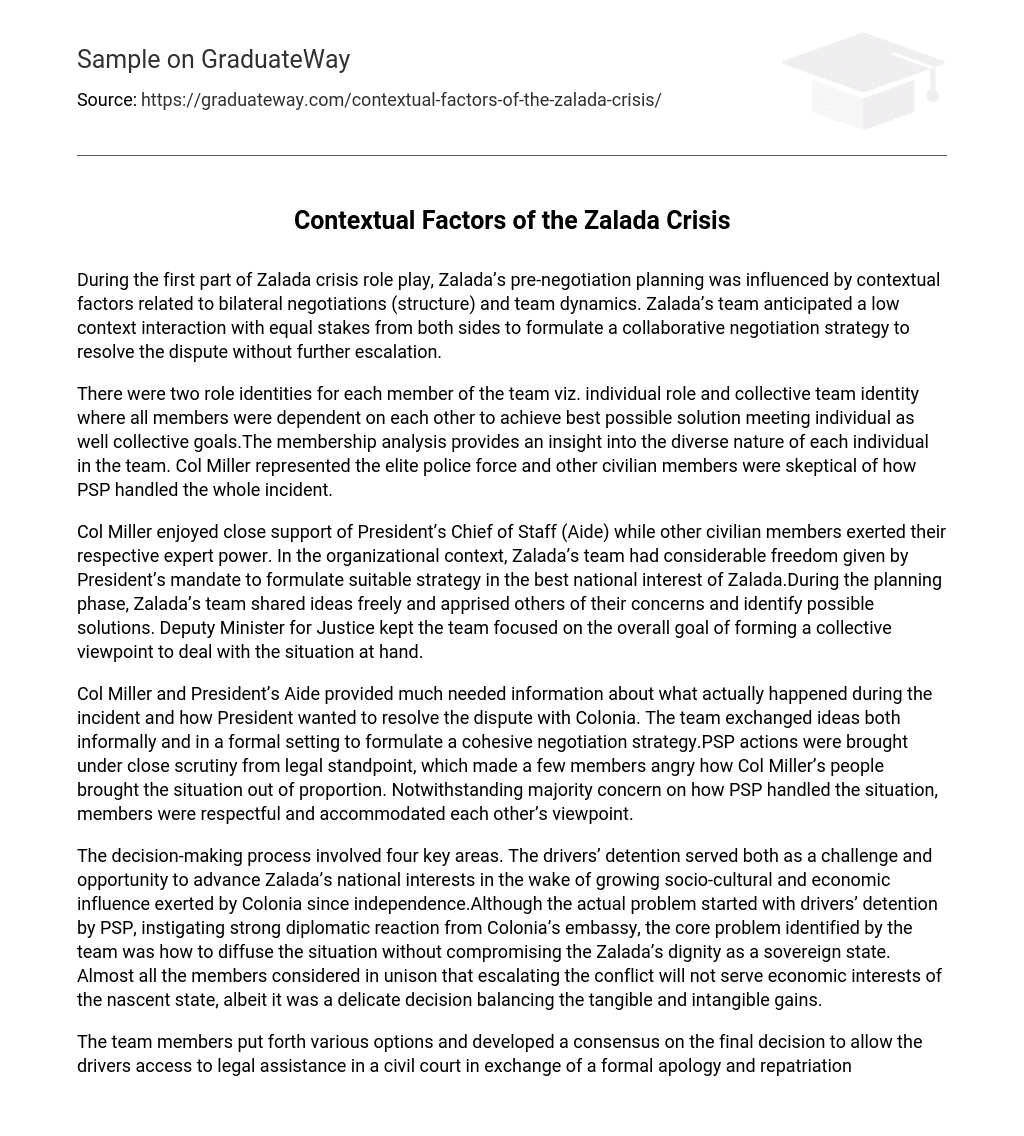During the initial phase of the Zalada crisis role play, the team’s pre-negotiation planning was influenced by contextual factors relevant to bilateral negotiations (structure) and team dynamics. The team expected a low-context interaction with equal stakes from both sides, and thus developed a collaborative negotiation strategy aimed at resolving the dispute without exacerbating the situation.
The team consisted of individuals who had two role identities: an individual role and a collective team identity. Each member relied on the others to achieve the best possible solution that met both individual and collective goals. Through membership analysis, we gained insight into the diverse nature of each team member. There was skepticism among the civilian members regarding how PSP handled the incident, while Col Miller represented the elite police force.
Col Miller received strong support from the President’s Chief of Staff, while other civilian members exerted their respective expert power. In the organizational context, Zalada’s team enjoyed a significant degree of freedom granted by the President to develop a suitable strategy in the best national interest of Zalada. Throughout the planning phase, the team freely exchanged ideas and informed others of their concerns and potential solutions. The Deputy Minister for Justice ensured that the team remained focused on the overarching goal of forming a collective viewpoint to address the current situation.
Col Miller and a President’s Aide provided valuable information regarding the incident and the President’s desired resolution with Colonia. The team discussed ideas both informally and formally to develop a unified negotiation strategy. The legal scrutiny of PSP actions angered a few members who felt that Col Miller’s team exaggerated the situation. Despite concerns about how PSP managed the situation, the majority of members were respectful and considerate of each other’s perspectives.
The decision-making process involved four key areas. The detention of the drivers by PSP was both a challenge and opportunity for Zalada to advance its national interests in response to Colonia’s growing socio-cultural and economic influence since gaining independence. While the initial issue stemmed from the drivers’ detention and sparked a strong diplomatic reaction from Colonia’s embassy, the team identified the core problem as finding a way to resolve the situation without compromising Zalada’s dignity as a sovereign state. The majority agreed that escalating the conflict would not benefit Zalada economically, although it required careful consideration to balance tangible and intangible gains.
The team members reached a consensus on allowing the drivers access to legal assistance in civil court in exchange for a formal apology and repatriation of Colonia’s ambassador due to his undiplomatic remarks against the head of Zalada state. The majority opinion was driven by economic imperatives and the President’s security, which put pressure on Col Miller and the President’s Aide. The communication among the team formed a triangular pattern, with President’s Aide, Col Miller, and Deputy Minister for Justice as influential members. Col Miller and the President’s Aide focused on the President’s stature and security, while the rest of the group focused on socio-economic and legal dimensions of the problem.
The overall outcome of the negotiation process was shaped by a hidden power struggle between two groups. However, the new information disclosed by all three noisy members played a significant role in this shaping. The team’s open discussion of mutual problems before considering alternate solutions was facilitated by the free and honest expression of ideas, leading to a more productive conversation. Col Miller’s emotional behavior during the discussion was influenced by his close relations with the President and others’ perception of the role of PSP. Despite his emotional attachment to the dispute, Col Miller displayed flexibility in considering others’ viewpoints and working towards a consensus solution.
Zalada’s team did not appoint a dedicated Devil’s Advocate; instead, members challenged the credibility of the suggested solutions through constructive criticism and considered how they would be received by the Colonia’s negotiating team. Overall, each member of Zalada’s team had unique interests and expertise based on their positions. The team dynamics allowed for this diverse group to share their concerns, assess the potential consequences of different solutions, and commit to implementing a collaborative decision. PERSONAL REFLECTION ON THE ROLE OF ZALADA’S PORT MANAGER: As the Port Manager, my involvement in intra-team planning was limited, as the primary focus was resolving the pressing issues regarding the custody of drivers and ensuring their access to their families and legal counsel.
During the team meeting, I informed my team about the significance of the port for Zalada’s economic sustenance and trade. Additionally, I emphasized the importance of the upcoming visit from Colonia’s Pacifica task force and the potential consequences of sanctions or a naval blockage by Colonia. To enhance our understanding of teamwork, we engaged in a role play simulation that allowed us to experience team dynamics. This exercise also helped us comprehend the challenges of making collaborative decisions that may be difficult but result in a long-term commitment from all participants in the decision-making process.
In a surprising turn of events, Col Miller displayed remarkable adaptability by agreeing to transfer individuals with differing opinions to a civil prison. Internal divisions emerged regarding the most effective approach to resolving the situation. Some members reacted emotionally to the undiplomatic behavior of the Colonia embassy within our own country, while others prioritized economic interests in order to quickly reach a settlement with Colonia.





